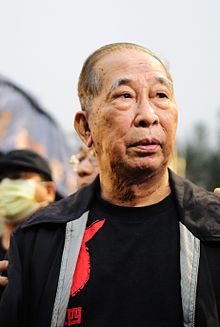Szeto Wah
| Szeto Wah 司徒華 |
|
|---|---|

Szeto Wah at the 21st anniversary candlelight vigil in Causeway Bay, Hong Kong
|
|
| Chairman of Hong Kong Professional Teachers' Union | |
|
In office 1974–1990 |
|
| Preceded by | New title |
| Succeeded by | Cheung Man-kwong |
| Chairman of Hong Kong Alliance in Support of Patriotic Democratic Movements in China | |
|
In office 21 May 1989 – 2 January 2011 |
|
| Preceded by | New title |
| Succeeded by | Lee Cheuk Yan |
| Member of the Legislative Council | |
|
In office 26 September 1985 – 12 September 1991 |
|
| Preceded by | New title |
| Succeeded by | Cheung Man-kwong |
| Constituency | Teaching |
| Majority | 68.64% (1985) Unopposed (1988) |
|
In office 12 September 1991 – 30 June 1997 |
|
| Preceded by | New seat |
| Succeeded by | Replaced by Provisional Legislative Council |
| Constituency | Kowloon East |
| Majority | 37.83% (1991) 55.40% (1995) |
|
In office 1 July 1998 – 30 September 2004 |
|
| Preceded by | New Parliament |
| Succeeded by | Albert Cheng |
| Constituency | Kowloon East |
| Majority | 33.33% (1998) 25.00% (2000) |
| Personal details | |
| Born |
28 February 1931 Hong Kong |
| Died | 2 January 2011 (aged 79) Hong Kong |
| Nationality | Chinese |
| Political party | Democratic Party |
| Spouse(s) | singled; not married |
| Alma mater |
Queen's College, Hong Kong Grantham College of Education |
| Profession | Teacher Politician |
| Religion | Christianity |
| Signature | |
| Website | http://www.szetowah.org.hk |
| Szeto Wah | |||||||||||||
| Traditional Chinese | 司徒華 | ||||||||||||
|---|---|---|---|---|---|---|---|---|---|---|---|---|---|
| Simplified Chinese | 司徒华 | ||||||||||||
|
|||||||||||||
| Transcriptions | |
|---|---|
| Standard Mandarin | |
| Hanyu Pinyin | Sī tú Huá |
| Yue: Cantonese | |
| Yale Romanization | Sī tòuh Wàh |
| Jyutping | Si1 tou4 Waa4 |
Szeto Wah (Chinese: 司徒華; 28 February 1931 – 2 January 2011) was a politician of the pan-democracy camp of Hong Kong. He was formerly the chairman of The Hong Kong Alliance in Support of Patriotic Democratic Movements in China and a member of the Legislative Council from 1985 to 1997 and 1998 to 2004.
Although the Hong Kong government prior to as well as after the British handover shunned him for his opposition to their policies, Szeto was admired in Hong Kong politics for his strong principles, for eschewing personal gain, and for his rare political acumen. According to commentator Stephen Vines, the Chinese central government appointed Szeto to the Hong Kong Basic Law Drafting Committee because they appreciated his political significance, even though they disliked his ideas.
Aside from his political career, Szeto was also well known for his Chinese calligraphy skills. He was referred to as "Uncle Wah" (華叔) by Hong Kong people.
Szeto Wah was born in Hong Kong in 1931 with ancestry from Kaiping, Guangdong. Ten years later his poor family fled to their ancestral home from Hong Kong due to the Japanese bombing in the 1941 Battle of Hong Kong. He enrolled in Queen's college and graduated from Grantham College of Education. He entered the teaching profession in 1952, and became headmaster of the GCEPSA Kwun Tong Primary School in 1961.
He became a baptized Christian in 1974.
Szeto was a core member of the pro-communist Hok Yau Dancing Club, of which he remained a member until 1958.
In 1973 he led the Hong Kong teacher's strike protest when the government proposed to cut teachers' salaries by 15%. He then founded the Hong Kong Professional Teachers' Union in 1974. Under his leadership, the HKPTU expanded rapidly and eventually became the most powerful pressure group in the late 70s to 80s. Szeto stepped down from the union president in 1990.
...
Wikipedia
